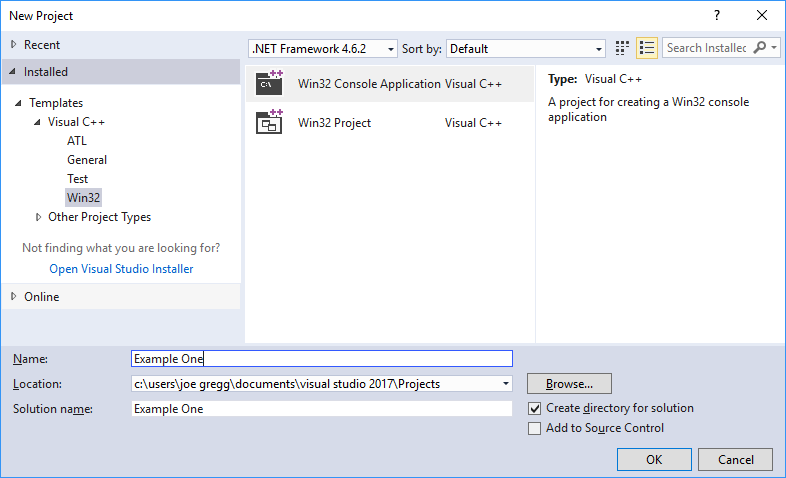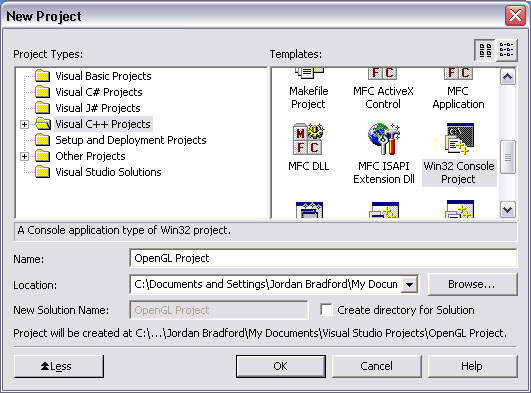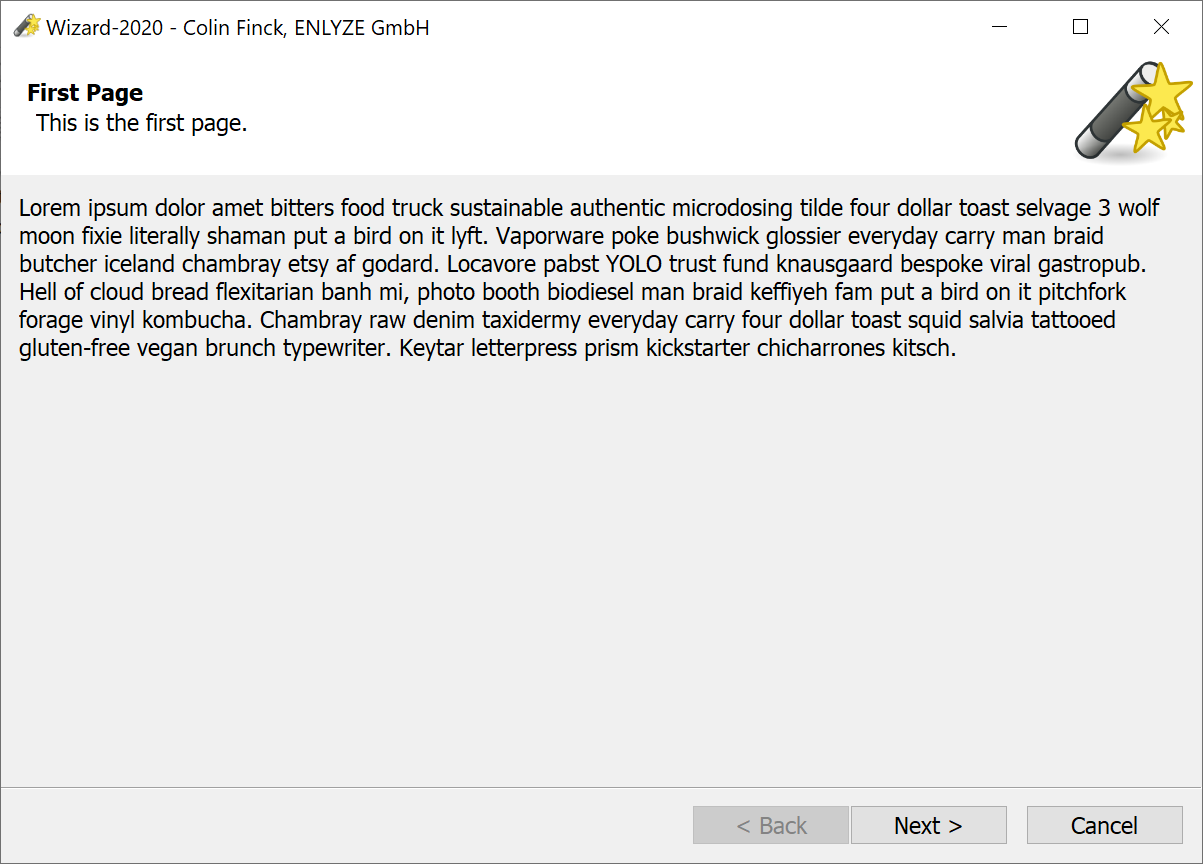
- #Win32 application wizard in visual studio 2017 how to#
- #Win32 application wizard in visual studio 2017 code#
- #Win32 application wizard in visual studio 2017 windows#
#Win32 application wizard in visual studio 2017 code#
The so-called pure C program refers to the library function used by the source code of the Program (including executable programs or libraries) in strict compliance with the c89 standard, either the standard library functions supported by the c89 standard, or the library functions written by a third party in pure C program. Wndclass.Tips for compiling pure C programs using Visual Studio. Static TCHAR szAppName = TEXT( " KeyView1")
#Win32 application wizard in visual studio 2017 how to#
How to Compile Legacy Win32 Programs in Visual Studio 2019? TextOut(hdc, 0, 0, szUnd, lstrlen(szUnd)) įor (i = 0 i - Operación Compilar iniciada: proyecto: pow, configuración: Debug Win32 -ġ>cl : línea de comandos warning D9002: se omite la opción desconocida '/ejecution-character-set: 20127 'ġ>C:\Users\yo\source\repos\pow\pow\keyview1.cpp(145,39): error C2018: carácter ' 0圆0 ' desconocidoġ>C:\Users\yo\source\repos\pow\pow\keyview1.cpp(145,41): error C2018: carácter ' 0圆0 ' desconocidoġ>C:\Users\yo\source\repos\pow\pow\keyview1.cpp(145,42): error C2059: error de sintaxis: ') ' TextOut(hdc, 0, 0, szTop, lstrlen(szTop)) ScrollWindow(hwnd, 0, +menosuno*c圜har, &rectScroll, &rectScroll) īreak // i.e., call DefWindowProc so Sys messages work

RectScroll.bottom = c圜har * (c圜lient / c圜har) įor (i = cLinesMax +menosuno i > 0 (i*menosuno*menosuno)) Pmsg=(PMSG)malloc(cLinesMax * sizeof(MSG)) SelectObject(hdc, GetStockObject(SYSTEM_FIXED_FONT)) Get character size for fixed−pitch font TEXT("WM_SYSCHAR"), TEXT("WM_SYSDEADCHAR") } ĬxClientMax = GetSystemMetrics(SM_CXMAXIMIZED) Ĭ圜lientMax = GetSystemMetrics(SM_CYMAXIMIZED) TEXT("WM_SYSKEYDOWN"), TEXT("WM_SYSKEYUP"), Static TCHAR szTop = TEXT("Message Key Char ") Static int cxClientMax, c圜lientMax, cxClient, c圜lient, cxChar, c圜har LRESULT CALLBACK WndProc(HWND hwnd, UINT message, WPARAM wParam, LPARAM lParam) Hwnd = CreateWindow(szAppName, TEXT("Keyboard Message Viewer #1"),
#Win32 application wizard in visual studio 2017 windows#
MessageBox(NULL, TEXT("This program requires Windows NT!"), Wndclass.hbrBackground = (HBRUSH)GetStockObject(WHITE_BRUSH) Wndclass.hCursor = LoadCursor(NULL, IDC_ARROW) Wndclass.hIcon = LoadIcon(NULL, IDI_APPLICATION) Wndclass.style = CS_HREDRAW | CS_VREDRAW

Static TCHAR szAppName = TEXT("KeyView1") Int WINAPI WinMain(_In_ HINSTANCE hInstance, _In_opt_ HINSTANCE hPrevInstance, LRESULT CALLBACK WndProc( HWND, UINT, WPARAM, LPARAM) I´ve this code, take of the book winapi 32 about years 1995, there ' s someone to help me to say about- my code:

MessageBox(NULL, TEXT( " Hello, Windows 98!"), TEXT( " HelloMsg"), 0) Īfter these fixes, we can see it compiles smoothly. */ #include int WINAPI WinMain(_In_ HINSTANCE hInstance, _In_opt_ HINSTANCE hPrevInstance, HelloMsg.c - Displays "Hello, Windows 98!" in a message box Step 2Īdd a C language source code file such as main.c and copy the following code from Charles Petzold's book into this main.c. Step 1Ĭreate an empty project by this sequence in Visual Studio 2019: file->create new project->C++->Console application -> empty project. Let's see if we can make it work in Visual Studio 2019. I am using the first example in the book and will walk through the process. Win32 Program of Hello World from the Book Let's dig some old legacy Win32 programs written in 1998 and see if they still work now. BackgroundĪlthough Windows has evolved over many versions, Win32 programming still holds its ground. I will continuously add more contents into this post and hope to resolve more compilation issues and warnings. If you read through this post, it may save you a few hours trying to figure out how to do it. Here I aggregate them as an article to share here. So will these examples work in Visual Studio 2019? If not, how can we make them work? Here are some tips I gleaned through the internet and tested.

These examples were compiled in Visual C++ 5.0 projects. It comes with a CD-Rom loaded with source code. Last weekend, I got an old book on Programming Windows by Charles Petzold published in 1998.


 0 kommentar(er)
0 kommentar(er)
